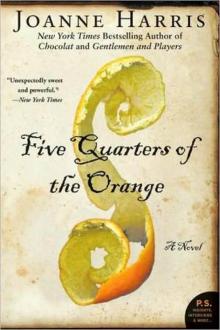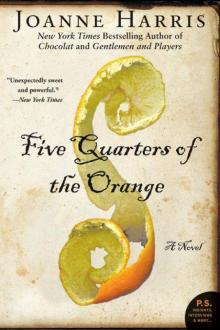- Home
- Joanne Harris
Five Quarters of the Orange: A Novel Page 10
Five Quarters of the Orange: A Novel Read online
Page 10
“Of course.” Cassis was looking pleased with himself, but I still sensed anxiety beneath the surface. He held his cigarette in the palm of his hand, as if in imitation of the Germans, but on him the gesture looked awkward and self-conscious.
“Do you tell them things? Do you?”
“We sometimes…tell them things,” admitted Cassis, smirking.
“What kind of things?”
Cassis shrugged. “It started with that old idiot and his radio,” he said in a low voice. “That was only fair. He shouldn’t have had it anyway, and he shouldn’t have pretended to be so shocked when all we were doing was watching the Germans. Sometimes we leave notes with a delivery man, or at the café. Sometimes the newspaper man gives us stuff they’ve left. Sometimes they bring it.” He tried for nonchalance but I could sense that he was anxious, edgy.
“It’s nothing important,” he continued. “Most of the Boches use the black market themselves anyway, and send stuff home to Germany. You know, stuff they’ve requisitioned. So it doesn’t really matter.”
I considered this. “But the Gestapo—”
“Oh, grow up, Boise!” Suddenly he was angry, as he always was when I put him under pressure. “What do you know about the Gestapo?” He looked around nervously, then lowered his voice again. “Of course we don’t deal with them. This is different. I told you, it’s just business. And anyway, it’s nothing to do with you.”
I faced him, feeling resentful. “Why not? I know things too.” I wished now that I had made more of Madame Petit with the German, that I had told him she was a Jew.
Cassis shook his head scornfully. “You wouldn’t understand.”
We rode home in slightly apprehensive silence, perhaps expecting Mother to have guessed about our unsanctioned trip, but when we got home we found her in unusual spirits. She did not mention the smell of oranges, her sleepless night or the changes I had made in her room, and the meal she prepared was almost a celebration dinner, with carrot and chicory soup, boudin noir with apple and potatoes, black buckwheat pancakes and clafoutis for dessert, heavy and moist with last year’s apples and crusted with brown sugar and cinnamon. We ate in silence as always, but Mother seemed abstracted, quite forgetting to tell me to take my elbows off the table and failing to see my tangled hair and smudged face.
Perhaps the orange had tamed her, I thought.
She made up for it the next day, however, reverting to her usual self again with a vengeance. We avoided her as best we could, doing our chores in haste then retreating to the Lookout Post and the river, where we played halfheartedly.
During these summer days at the river Paul came with us, but he sensed that he was no longer a part of us, that he was excluded from the circle we made. I felt sorry for him, even a little guilty, knowing what it was like to be excluded, but could do nothing to prevent it. Paul would have to fight his own battles, as I had fought mine.
Besides, Mother disliked Paul as she disliked the entire Hourias family. In her eyes Paul was an idler, too lazy to go to school, too stupid even to learn to read in the village with the other children. His parents were just as bad—a man who sold bloodworms by the side of the road and a woman who mended other people’s clothes. But my mother was especially vicious about Paul’s uncle. At first I thought this was simply village rivalry. Philippe Hourias owned the biggest farm in Les Laveuses, acres of sunflower fields and potatoes and cabbages and beets, twenty cows, pigs, goats, a tractor at a time when most local people still used hand plows and horses, a proper milking machine…. It was jealousy, I told myself, the resentment of the struggling widow against the wealthy widower. Still, it was odd, given that Philippe Hourias had been my father’s oldest friend. They had been boys together, fishing, swimming, sharing secrets. Philippe had carved my father’s name on the war memorial himself, and always laid flowers at its base on Sundays. But Mother never acknowledged him with more than a nod. Never a gregarious soul, after the orange incident she seemed more hostile than ever toward him.
In fact it was only much later that I began to guess at the truth. When I read the album, in fact, more than forty years afterward. That tiny, migraine-inducing script staggering across the bound pages. She wrote:
Hourias knows already. I see him looking at me sometimes. Pity and curiosity, like I was something he ran over in the road. Last night he saw me coming out of La Rép with the things I need to buy there. He didn’t say anything, but I knew he’d guessed. He thinks we should marry, of course. It makes sense to him, widow and widower, marrying their land together. Yannick had no brother to take over when he died. And a woman isn’t expected to run a farm alone.
If she had been a naturally sweet woman, perhaps I might have suspected something sooner. But Mirabelle Dartigen was not a sweet woman. She was rock salt and river mud, her rages as quick and furious and inevitable as summer lightning. I never sought the cause, merely avoiding the effect as best I could.
15.
There were no more trips to Angers that week, and neither Cassis nor Reinette seemed inclined to speak of our meeting with the Germans. As for myself, I was reluctant to mention my conversation with Leibniz, though I was unable to forget it. It made me feel by turns apprehensive and oddly powerful too.
Cassis was restless, Reinette sullen and discontented, and to add to that it drizzled all week, so that the Loire swelled ominously and the sunflower fields were blue with rain. Seven days had passed since our last visit to Angers. Market day came and went; this time Reinette accompanied Mother to town, leaving Cassis and myself to prowl discontentedly through the dripping orchard. The green plums on the trees made me think of Leibniz, with an odd mixture of curiosity and disquiet. I wondered whether I would ever see him again.
Then, unexpectedly, I did.
Early in the morning of the next market day, it was Cassis’s turn to help with the provisions. Reine was fetching the new cheeses, wrapped in vine leaves, from the coolroom and Mother was collecting eggs from the henhouse. I was just back from the river with the morning catch, a couple of small perches and bleaks that I had chopped for bait and left in a bucket by the window. It was not the Germans’ usual day to call, and as a result it was I who happened to open the front door when they knocked.
There were three of them: two I did not recognize, and Leibniz, very correct now in uniform, standing with a rifle slung into the crook of his arm. His eyes widened a little in surprise when he saw me, then he smiled.
If it had been any other German standing there I might have shut the door in their faces, as Denis Gaudin did when they came to requisition his violin. I would certainly have called Mother. But on this occasion I was unsure; I fidgeted uneasily on the doorstep, wondering what to do.
Leibniz turned to the other two and spoke to them in German. I thought I understood from the gestures that accompanied his words that he intended to search our farm himself while the others moved down the lane toward the Ramondin and Hourias places. One of the other Germans looked at me and said something. The three of them laughed. Then Leibniz nodded and, still smiling, stepped past me into our kitchen.
I knew I should call Mother. When the soldiers called she was always more sullen than ever, stonily resentful of their presence and their casual appropriation of anything they required. And today of all days! Her temper was bad enough as it was: this would be the final blow.
Supplies were getting scarce, Cassis had explained when I had asked him about it. Even Germans had to eat. “And they eat like pigs!” he had continued with indignation. “You should see their canteen—whole loaves of bread, with jam and pâté and rillettes and cheese and salted anchovies and ham and sour cabbage and apple—you wouldn’t believe it!”
Leibniz closed the door behind him and looked around. Away from the other soldiers his posture was relaxed, more like a civilian’s. He reached in his pocket and lit a cigarette.
“What are you doing here?” I demanded at last. “We don’t have anything!”
“Orders, Backfi
sch,” said Leibniz. “Is your father about?”
“I don’t have a father,” I replied with a touch of defiance. “Germans killed him.”
“Ah. I’m sorry.” He seemed embarrassed, and I felt a little swell of pleasure inside. “Your mother, then?”
“Out back.” I glared at him. “It’s market day today. If you take our market stuff we won’t have anything left. We just manage as it is.”
Leibniz glanced around—a little shamefacedly, I thought. I saw him take in the clean tiled floor, the patched curtains, the scarred stripped-pine table. He hesitated.
“I have to do it, Backfisch,” he said softly. “I’ll be punished if I don’t obey orders.”
“You could say you didn’t find anything. You could say there was nothing left when you came.”
“Perhaps.” His eyes lit on the bucket of scraps by the window. “Fisherman in the family, is there? Who is it, your brother?”
I shook my head. “Me.”
Leibniz was surprised. “Fishing?” he echoed. “You don’t look old enough.”
“I’m nine,” I said, stung.
“Nine?” Lights danced in his eyes, but his mouth stayed serious. “I’m a fisherman myself, you know,” he whispered. “What is it you fish for around here? Trout? Carp? Perch?”
I shook my head.
“What then?”
“Pike.”
Pikes are the cleverest of freshwater fish. Sly and cautious in spite of their vicious teeth, they need carefully selected bait to lure them to the surface. Even the smallest thing can make them suspicious: a fraction of a change in temperature; the hint of a sudden movement. There is no quick or easy way to do it; blind luck apart, catching pike takes time and patience.
“Well, that’s different,” said Leibniz thoughtfully. “I don’t think I could let down a fellow fisherman in trouble.” He grinned at me. “Pike, eh?”
I nodded.
“What d’you use, bloodworms or boluses?”
“Both.”
“I see.” This time he did not smile; it was a serious business. I watched him in silence. It was a ploy that never failed to make Cassis uneasy.
“Don’t take our market stuff,” I repeated.
There was another silence.
Then Leibniz nodded. “I suppose I could manage to think of some story to tell them,” he said slowly. “You’d have to keep quiet, though. Or you could get me into real trouble. Do you understand?”
I nodded. It was fair. After all, he’d kept quiet about the orange. I spat on my palm to seal the bargain. He did not smile, but shook hands with perfect seriousness, as if this were an adult arrangement between us. I half-expected him to ask me for a favor in return, but he did not, and the thought pleased me. Leibniz wasn’t like the others, I told myself.
I watched him go. He did not look back. I watched him as he sauntered down the lane toward the Hourias farm and flicked his cigarette end into the outhouse wall, its glowing tip striking red sparks against the dull Loire stone.
16.
I said nothing to Cassis or Reinette about what had occurred between Leibniz and myself. To have spoken of it to them would have robbed it of its potency. Instead I hugged my secret close, turning it over in my mind like a stolen treasure. It gave me a peculiarly adult feeling of power.
I now thought of Cassis’s film magazines and Reinette’s lipstick with a certain contempt. They thought they’d been so clever. But what had they really done? They’d behaved like children telling tales in school. The Germans treated them like children, bribing them with trinkets. Leibniz had not tried to bribe me. He had spoken to me as an equal, with respect.
The Hourias farm had been badly hit. A week’s supply of eggs requisitioned, half the milk, two whole sides of salted pork, seven pounds of butter, a barrel of oil, twenty-four bottles of wine (ill concealed behind a partition in the cellar), plus any number of terrines and preserves. Paul told me about it. I felt a small pang for him—his uncle provided most of the family’s supplies—but promised myself I would share my own food with him whenever I could. Besides, the season was just beginning. Philippe Hourias would make up his losses soon enough. And I had other things on my mind.
The orange bag was still hidden where I had left it. Not under my mattress—though Reinette still insisted upon keeping her original cache for the beauty aids she imagined to be secret. No, my secret place was a great deal more imaginative. I placed the bag in a small screw-top glass jar and sunk it elbow deep in a barrel of salted anchovies that my mother kept in the cellar. A piece of string tied around the lip of the jar would enable me to locate it when needed. Discovery was unlikely, as Mother disliked the pungent scent of the anchovies and usually sent me to fetch any that might be required.
I knew it would work again.
I waited until Wednesday evening. This time I hid the bag in the spill tray under the stove, where the heat would release the vapor the quickest. Sure enough, Mother was soon rubbing her temple as she worked at the stove, snapping sharply at me if I was late in bringing her flour or wood, scolding—mind you don’t chip my good plates, girl!—and sniffing the air with that animal look of confusion and distress. I closed the kitchen door for maximum effect, and the scent of orange invaded the room once again. I hid the bag in her pillow as before—the pieces of orange peel were crisp by then, blackened by the heat of the stove, and I felt sure that this would be the last time I used the orange bag—pushing it into the pillow beneath the striped slip.
Dinner was burnt.
No one dared mention it, though, and my mother fingered the black brittle lace of her charred pancakes and touched her temple over and over until I was sure I would scream. This time she did not ask whether we had brought oranges into the house, though I could tell she wanted to. She just touched and crumbled and fingered and fidgeted, sometimes breaking the silence with a fierce exclamation of rage at some trivial infringement of the house rules.
“Reine-Claude! Bread on the breadboard! I don’t want you getting crumbs on my clean floor!”
Her voice was waspish, exasperated. I cut a slice of bread, deliberately turning the bread over onto the breadboard so that the flat underside was uppermost. For some reason this always enraged Mother, as did my habit of cutting off the crusty piece from either end of the loaf and discarding the middle section.
“Framboise! Turn that bread over!” She touched her head again, fleetingly, as if checking it was still there. “How many times have I told you about—”
Then she froze midsentence, head on one side, mouth open.
She stayed that way for thirty seconds or so, staring at nothing with the face of a slow pupil trying to remember Pythagoras’s theorem or the rule of the ablative absolute. Her eyes were glassy-green and blank as winter ice. We looked at one another in silence, watching her as the seconds passed. Then she moved again, a brusque and typical gesture of irritation, and began to clear the dishes even though we were only halfway through the meal. No one mentioned that, either.
The next day, as I had predicted, she kept to her bed, and we went to Angers as before. Not to the pictures this time; instead we loitered in the streets, Cassis ostentatiously smoking one of his cigarettes, and settled on the terrasse of a town-center café, Le Chat Rouget. Reinette and I ordered diabolo-menthe, and Cassis began to order pastis, changing meekly to panaché beneath the supercilious gaze of the waiter.
Reine drank carefully, trying not to smear her lipstick. She seemed nervous, head ticking from side to side as if watching out for something.
“Who are we waiting for?” I inquired. “Your Germans?”
Cassis glared at me. “Tell everyone, won’t you, you idiot!” he snapped. He lowered his voice. “We sometimes meet here,” he explained. “You can pass messages. No one notices. We trade information.”
“What kind of information?”
Cassis made a sound of derision. “Anything,” he said impatiently. “People with radios. Black market. Traffickers. Resis
tance.” He gave this last word a heavy emphasis, lowering his voice still further.
“Resistance,” I repeated.
Try to see what that meant to us. We were children. We had our own rules. The adult world was a distant planet inhabited by aliens. We understood so little of it. Least of all the Resistance, that fabulous quasi-organization. Books and the television made it sound so focused in later years; but I remember none of that. Instead I remember a mad scramble in which rumor chased counter-rumor and drunkards in cafés spoke loudly against the new régime, and people fled to relatives in the country, out of the reach of an invading army already stretched beyond tolerance in the towns. The One Resistance—the Secret Army of popular understanding—was a myth. There were many groups, Communists and Humanists and Socialists and people seeking martyrdom and swaggarts and drunkards and opportunists and saints—all sanctified by time, but in those days nothing like an army, and hardly a secret. Mother spoke of them with scorn. According to her, we’d all be better off if people just kept their heads down.
Even so, Cassis’s whisper awed me. Resistance. It was a word that appealed to my sense of adventure, of drama. It brought images of rival gangs struggling for power, of nighttime escapades, shootings, secret meetings, treasures, dangers braved. In a sense this was still very similar to the games we had played in previous years, Reine, Cassis, Paul and I: the potato guns, passwords, the rituals. The game had broadened a little, that was all. The stakes were higher.
“You don’t know any Resistance,” I said cynically, trying not to sound impressed.
“Not yet, maybe,” said Cassis. “But we could find out. We’ve found out all kinds of things already.”
“It’s all right,” continued Reinette. “We don’t talk about anyone in Les Laveuses. We wouldn’t tell on our neighbors.”
I nodded. That wouldn’t be fair.
“Anyway, in Angers it’s different. Everyone’s doing it here.”

 The Evil Seed
The Evil Seed Gentlemen and Players
Gentlemen and Players A Cat, a Hat, and a Piece of String
A Cat, a Hat, and a Piece of String Different Class
Different Class Chocolat
Chocolat Five Quarters of the Orange: A Novel
Five Quarters of the Orange: A Novel A Pocketful of Crows
A Pocketful of Crows Runelight
Runelight Runemarks
Runemarks Jigs & Reels: Stories
Jigs & Reels: Stories Sleep, Pale Sister
Sleep, Pale Sister Holy Fools
Holy Fools The Testament of Loki
The Testament of Loki Peaches for Monsieur Le Curé
Peaches for Monsieur Le Curé Blueeyedboy
Blueeyedboy The Lollipop Shoes
The Lollipop Shoes Coastliners
Coastliners Jigs & Reels
Jigs & Reels Five Quarters of the Orange
Five Quarters of the Orange